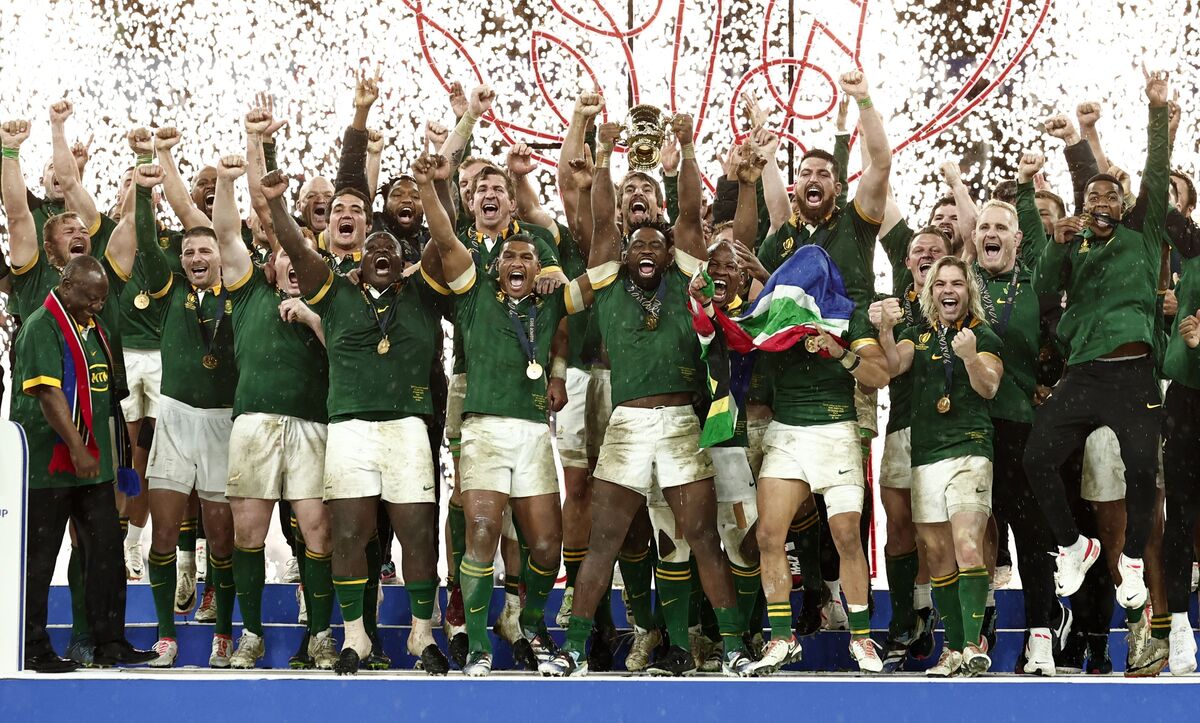
GLASGOW ― In damp autumnal conditions, the 10th Rugby World Cup concluded at Stade de France in Saint-Denis, a northern Paris suburb, with a tight contest between tournament heavyweights New Zealand and South Africa on Saturday, October 28.
The competition, which began seven weeks ago in late summer tropical conditions, ended on a wet night in the French capital that signaled the beginning of the Northern Hemisphere winter.
Seasons change, but in international rugby it seems some things stay the same. The All Blacks of New Zealand and the Springboks of South Africa renewed their fierce but respect-filled rivalry as their monopolization of the Webb Ellis Cup continued. Since 2007, the cup has only been won by these two countries.
While the players of New Zealand and South Africa will be returning home to a Southern Hemisphere summer, it will be those who represented the famous bottle green jersey of South Africa who will be looking forward to enjoying some fun in the sun following their World Cup win.
The Springbok squad has truly mastered the art of the narrow win. In the quarterfinal it triumphed 29-28 over France. The semifinal was won 16-15 against England and it capped its run to the trophy by defeating New Zealand 12-11.
South Africa has now contested four World Cup finals, and won them all.
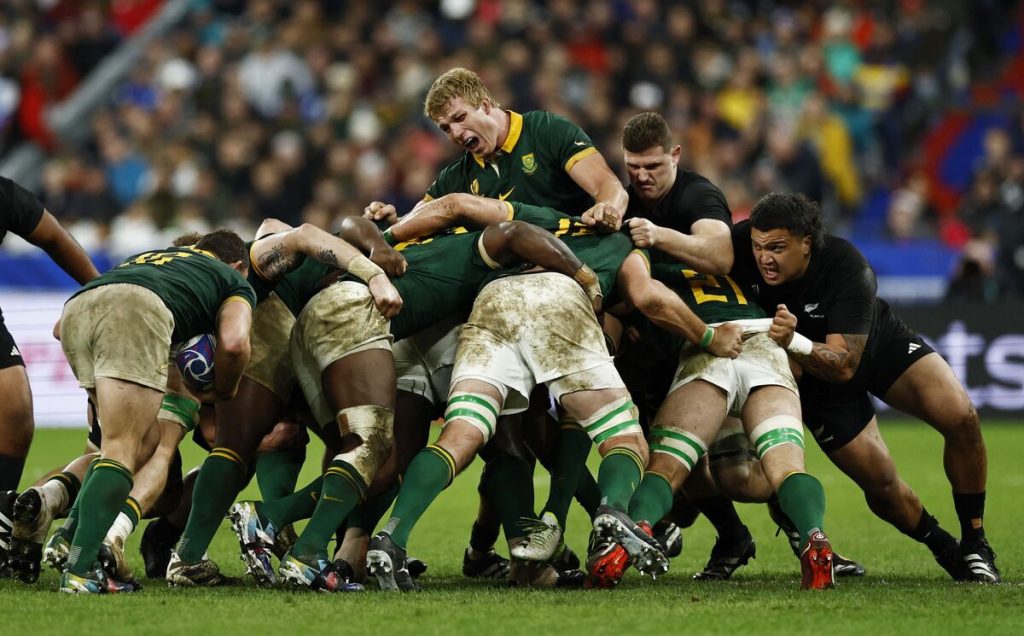
Du Toit Shines in the Rugby World Cup Final
South Africa's Pieter-Steph du Toit was voted Player of the Match for his phenomenal tackling display ― the flanker completed 28 tackles in the match and was a dominating presence at the breakdown.
"It's an unbelievable honor and privilege to play with this team. The last three games were quite tough, each one we played as a final and each one was just by one point so we are quite happy with the win," du Toit said to the world feed broadcast immediately after the final whistle.
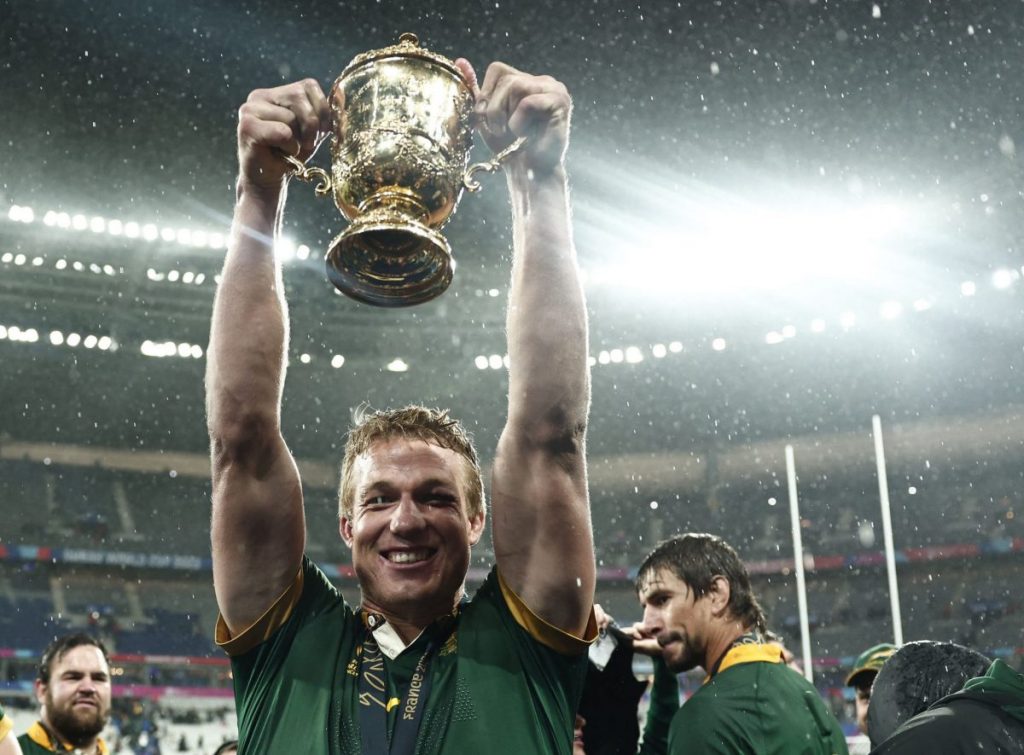
Du Toit added, "For all of South Africa, we are honored to play for you guys and to play for the Springboks and I know when we go back home there's going to be a warm welcome for us."
South African Defense, Speed and Kicking Dominate First Half
The opening 40 minutes was defined by South Africa's incredible desire to compete for every ball at the breakdown and its ability to turn the tables on New Zealand with some precise kicking from hand.
What's more, the smothering play at the breakdown denied New Zealand time and space to use the ball in the early stages. The speed its players moved at to contest each breakdown had to be seen to be believed.
This intense level of defending led to penalties being awarded. Any that were within range for fly-half Handre Pollard were nominated for shots at the posts.
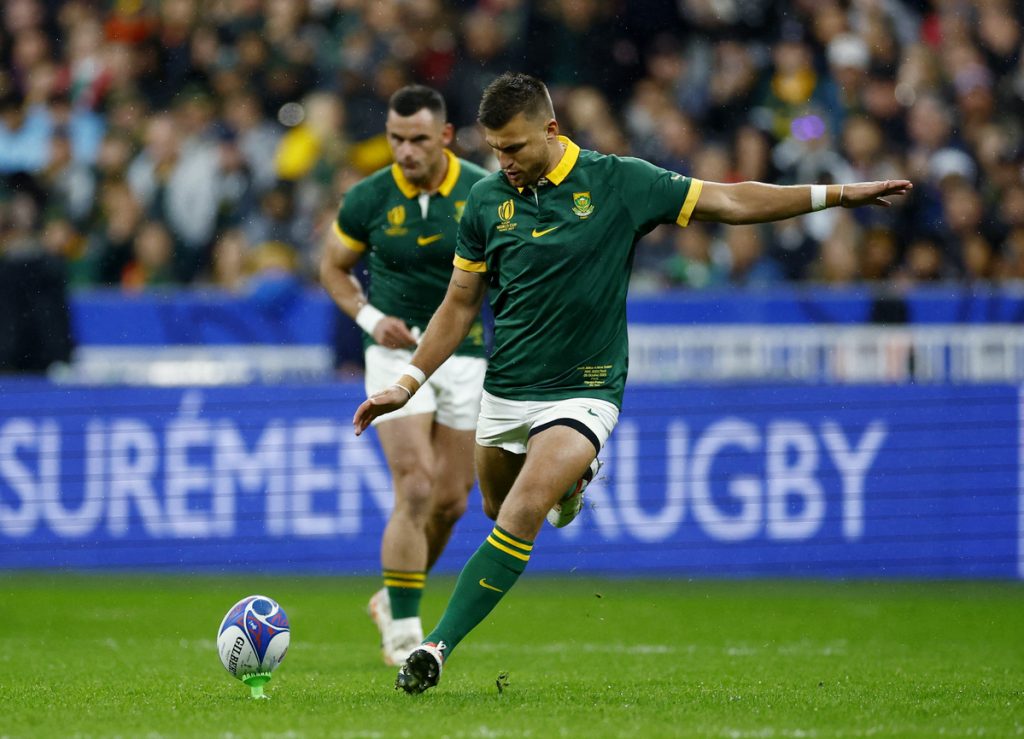
Pollard converted all four of these chances in the 3rd, 12th, 19th and 34th minutes. Four times three makes 12, and 12 points were all that were required for the Springboks.
Pollard also kept New Zealand on the back foot with his superb kicking from hand. His towering spiral kicks, which cascaded down from the Parisian night sky onto New Zealand's back line, led to handling errors from the All Blacks players. It helped South Africa establish territorial dominance in the first half.
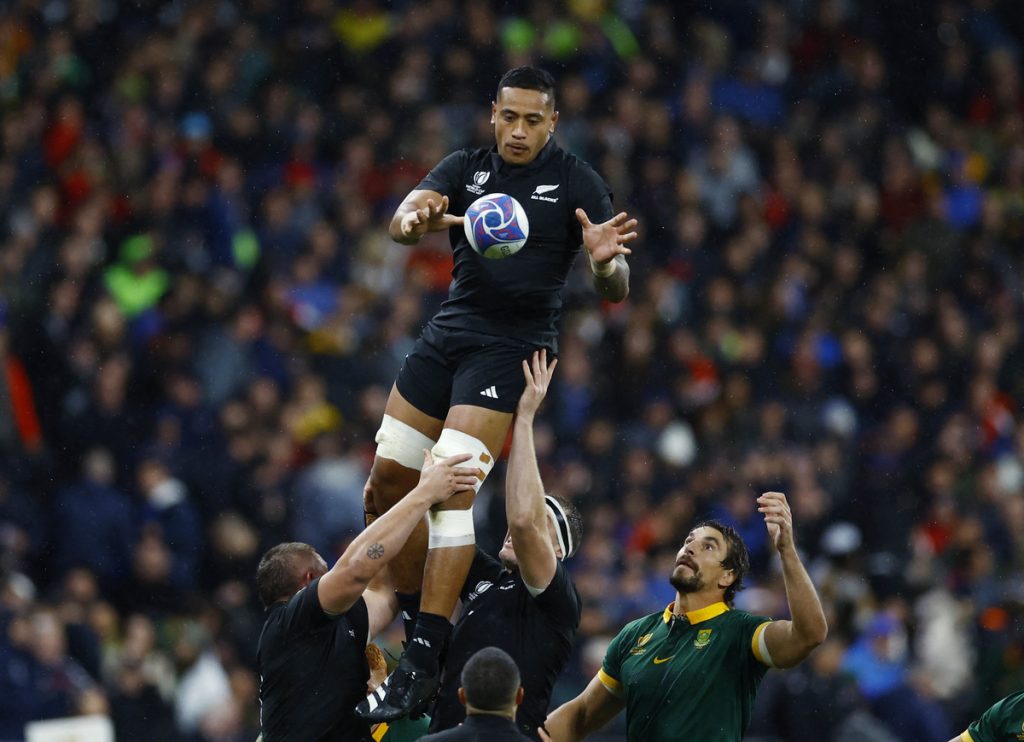
Discipline Issues Provide Further First-Half Talking Points
The other key aspect of the opening half was the split-second individual decisions that led to the referee having to take disciplinary action.
Wayne Barnes of England was the man handed the responsibility of refereeing the final. Barnes, along with his TMO (television match official) Tom Foley, would have a busy evening.
Their work started as early as the second minute. All Blacks flanker Shannon Frizell rolled his weight onto South African hooker Mbongeni Mbonambi's leg. The infraction was noticed and Frizell was shown a yellow card.
As a result of the incident, Mbonambi had to leave the field injured. He would play no further part in the match.
By the time Frizell had served his 10 minutes in the sin bin, New Zealand trailed 6-0.
A reply from the kicking tee from All Blacks fly-half Richie Mo'unga halved South Africa's advantage but Pollard had soon restored the Springboks' six-point lead.
Worse was to come for New Zealand when captain Sam Cane was sent to the sin bin in the 28th minute. The TMO alerted the referee to a tackle made by Cane where his shoulder came into contact with the head of opponent Jesse Kriel.
Pollard nailed the resulting penalty to give South Africa a 12-3 lead. New Zealand had to absorb another blow when the referee informed vice-captain Ardie Savea that Cane's yellow had been upgraded to a red by the disciplinary bunker. New Zealand would play the remainder of the match with 14 players.
A Mo'unga penalty shortly before halftime kept New Zealand in touch on the scoreboard and told South Africa it would not go quietly into the night.
New Zealand Plays Rugby in the 2nd Half; South Africa Holds On
An early second-half yellow card for South Africa skipper Siya Kolisi turned the match into a 14-against-14 affair for 10 minutes.
Kolisi was penalized in the 45th minute for head-on-head contact with Savea. Crucially though Kolisi's infraction had some mitigating factors and it correctly just remained a yellow card.
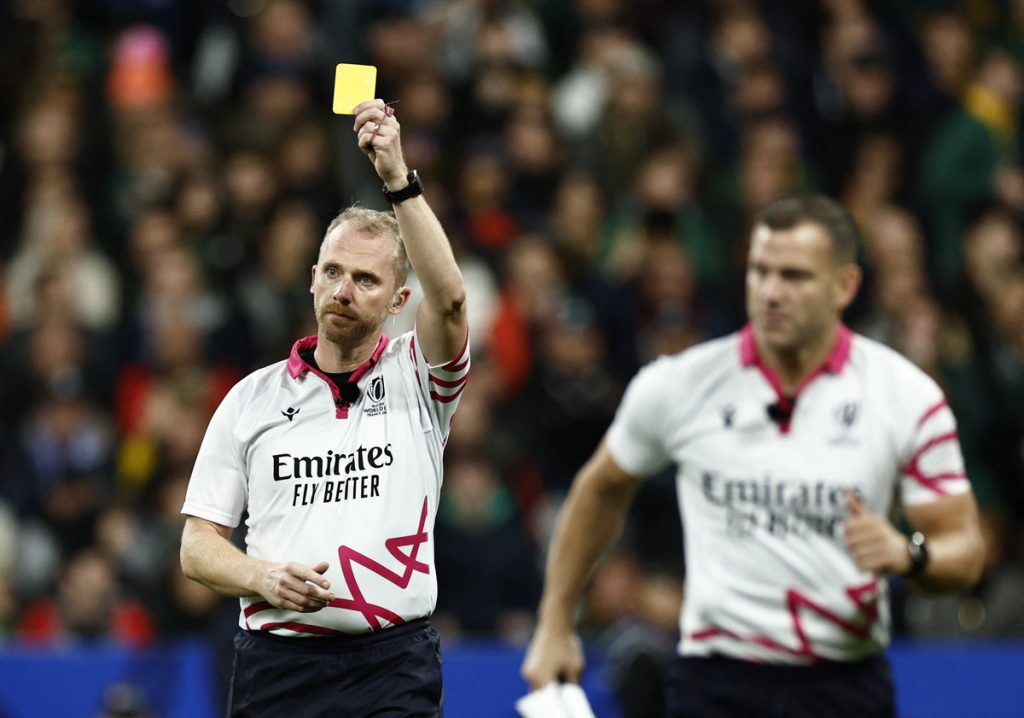
While Kolisi was off, New Zealand was able to get its running rugby going. A 53rd-minute Aaron Smith try was chalked off for a knock-on but the All Blacks were beginning to purr.
Kolisi was back on the field four minutes later but he couldn't prevent All Blacks fullback Beauden Barrett crossing the line for the only try of the match.
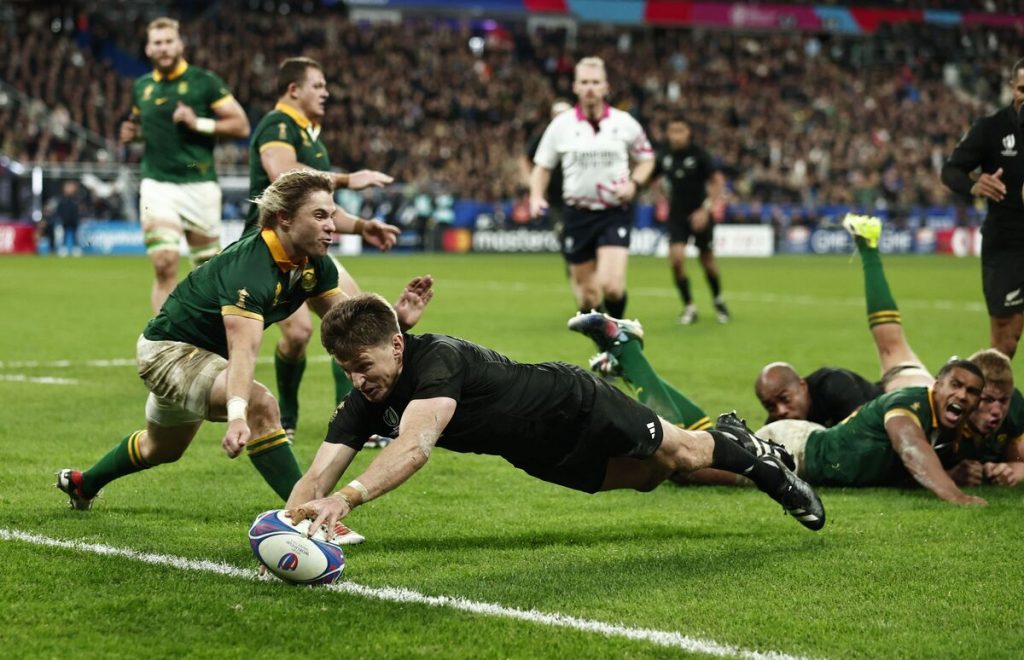
The score capped off a period of territorial dominance from New Zealand. It felt like the tide was turning.
Mo'unga's conversion attempt slid narrowly wide and South Africa held a one-point lead ― 12-11. There would be no more scoring.
Tactical Kicking and One Last All Blacks' Chance
With just one point between the rugby behemoths, a tactical kicking battle ensued. No one wanted to make a key error.
South African winger Cheslin Kolbe almost put himself in that unwanted position. With 72 minutes on the clock, Kolbe deliberately knocked the ball on to thwart a New Zealand attack.
A yellow card followed and New Zealand had a penalty just inside the South African half. Long-range kicker Jordie Barrett lined up a three-point attempt, and while his strike was pure the ball slid agonizingly wide of the left upright.
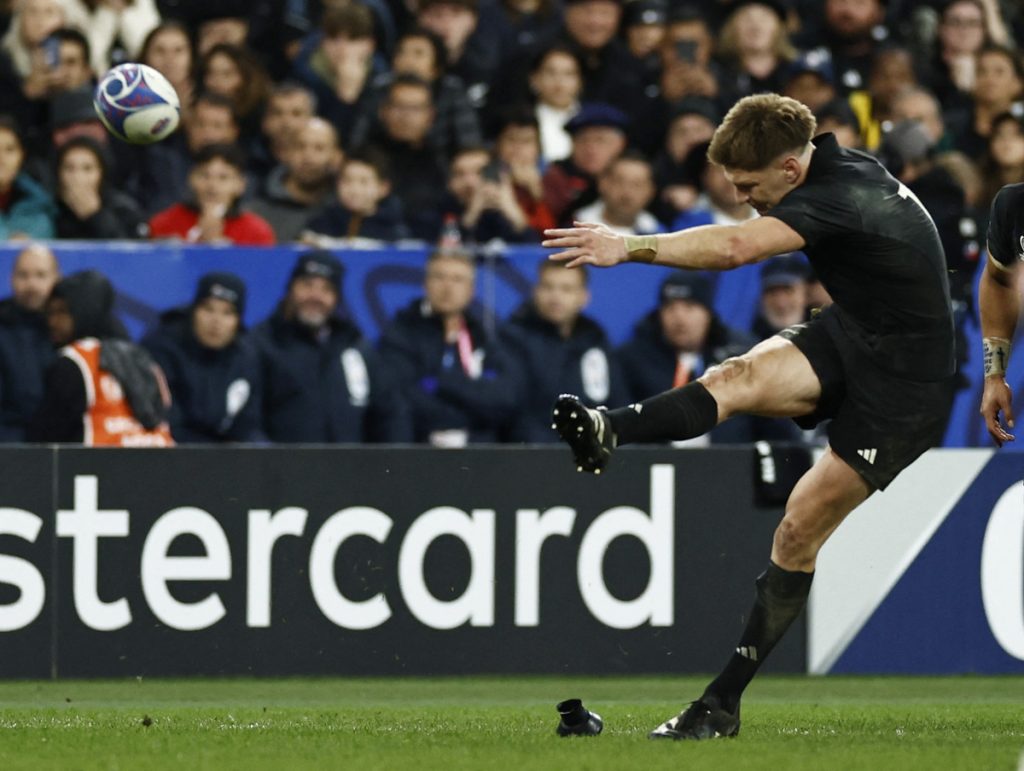
The remainder of the game saw South Africa maintaining its defensive determination. New Zealand kept trying to find another seam in the Boks defense but it wasn't to be for the men in black.
Barnes' final whistle sounded and South Africa was on top of the rugby world for the fourth time. Its resolve is truly remarkable.
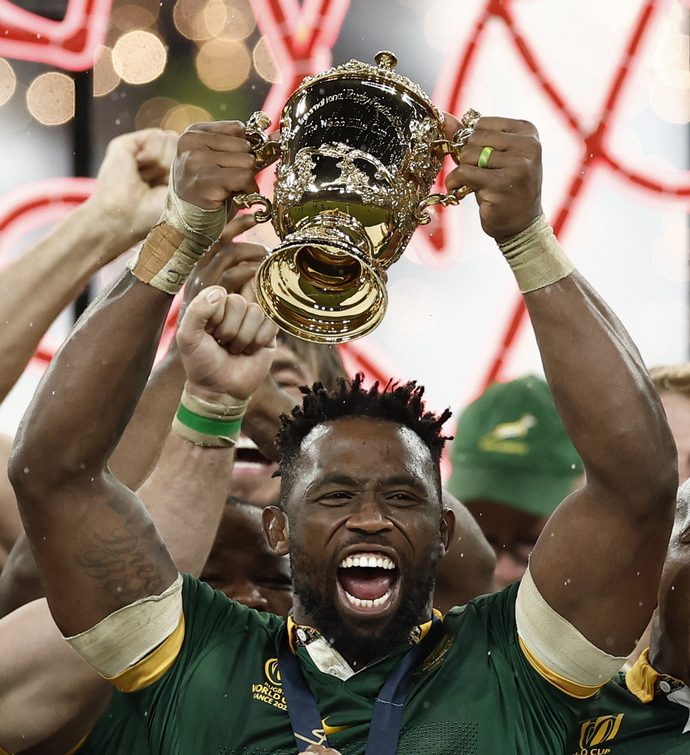
Some Additional Quotes
Winning captain Kolisi was in demand from the media.
"There are no ways I can explain it. I want to give credit to the All Blacks. They took us to the end, they took us to a dark place," Kolisi said to BBC Radio 5 Live.
The captain continued: "Credit to my boys too for the fight. We lost our hooker in the early part of the game and we had to adjust to that. People who are not from South Africa don't understand what it means for our country. It is not just about the game. Our country goes through such a lot. We are just grateful that we can be here."
Losing captain Cane also spoke on the BBC Radio 5 Live broadcast: "I am extremely gutted and disappointed. First of all, that the guys had to play with 14 men for the last 50-odd minutes."
Cane went on to add, "I thought the courage they showed out here tonight was incredible, the whole team are absolute warriors. It's tough. I would like to say well done to South Africa. Back-to-back winners, they have been a fantastic team."
And Finally...
Rugby fans in Japan, here is a little statistic for you from Saturday night's game.
Of the 30 players selected to start the World Cup Final, 12 of them will play their club rugby in Japan Rugby League One during the 2023-24 season.
That means that a high percentage of the very best players in the world will be taking to the field at a venue near you during the season. Get along to your local club and watch in person if you can!
RELATED:
- Rugby World Cup: Pool Stage Review and Knockout Stage Predictions
- 2023 Rugby World Cup: Group Stage Preview
Author: Colin Morrison
Morrison is a freelance sportswriter. Find his stories on SportsLook. Writing since 2016, Morrison's byline also appears on boxing website NYFights.com and multi-sports platform Spitballingpod.com. His main areas of interest are boxing, soccer, golf and rugby union. Morrison is from Scotland and can be found on X (formerly Twitter) @Morrie1981.

Nagoya Basho Tournament Records
| Day | Opponent | Result |
|---|










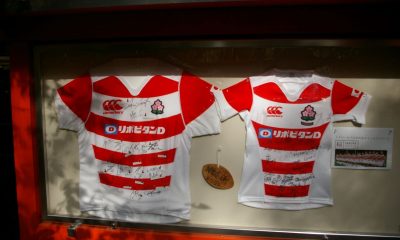





You must be logged in to post a comment Login